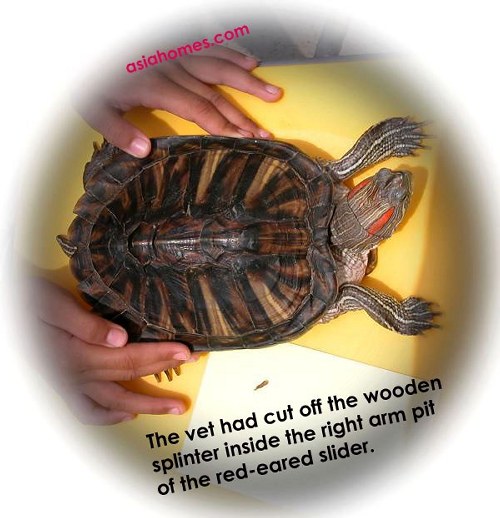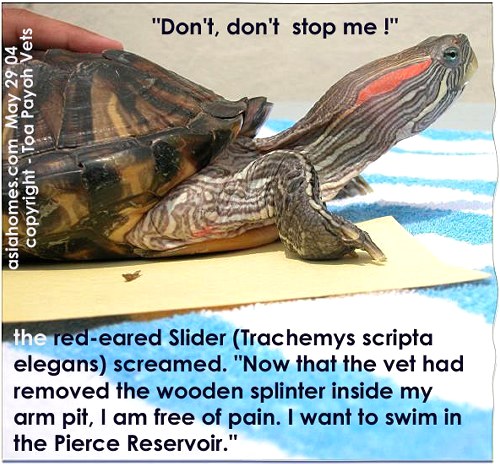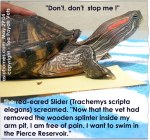MY RED-EARED
SLIDER STOPPED WALKING ONE DAY
|
Turtles and tortoises are the most popular reptiles kept as
pets in Singapore. They are symbols of longevity and hard
work and are easier to keep in small apartments and
houses. They are kept in tanks and don't smell bad or
make a lot of noises unlike dogs. Mum permitted
me to keep one pet. No dogs or cats as our apartment
was very small.
I chose a turtle, bought from a store in the wet
market of Ang Mo Kio Avenue Four in Singapore. I
was 8 years old and this turtle was a 20-cent coin in
size. No medical problems for the past 7 years.
Easy to maintain and a good friend to "talk to"
whenever I needed somebody to talk to about my busy
school life and friends.

One day, my red-eared slider was not walking normally one day.
He
tilted his body towards the left. He lifted his right leg
and could not walk straight. He toppled.
Then he stopped walking for the whole day.
I cancelled my appointments. My best
friend needed a veterinarian. The whole
family went to the
veterinary surgery. At the surgery, he could walk and
sniffed the stainless steel examination table.
"This
is a
common situation for many pet owners at the veterinary
surgery, " the veterinarian said. "The pets
look normal when they should be sick!"
So, what was the
problem for this turtle? The veterinarian lifted him up.
Checked him from eye to toe. Shell to tail.
Just below and in front of its right armpit, embedded under
the skin was a 4 mm-long wooden splinter. "This is a 'foreign body',
the vet said. He took a pair of scissors.
Shelled out the splinter embedded under the thick
green-striped skin. I felt dizzy when I saw a bit
of blood oozing from the wound. My brother supported
me.
Suddenly the Red-eared Slider wanted
only to sprint away from the animal doctor. To
the most tranquil and scenic Singapore's Pierce
Reservoir?
No, he would be safer and well cared for at home. My
mother would check him out every day and he always
made a welcoming noise whenever I came home.
|
 |
BE
KIND TO PETS.
The picture says "I want to swim in the Pierce
Reservoir" sends a message to new pet owners to be
responsible for their pets. It is not
meant to encourage turtle swimming in reservoirs.
His owners would never allow it to swim in any reservoir as it
would swim far
away and be lost.
He was very well cared for and never needed veterinary
attention for the past 7 years. Till it had a foreign
body.
DON'T abandon the
Red-eared Sliders
in reservoirs and ponds in the Botanic Gardens, Mount Faber
ponds and parks. When you have a pet, BE KIND.
Take care of it for as long as it lives.
|
MORE INFO ABOUT THE RED-EARED
SLIDER
The top of the shell (carapace) is smooth and gently curved and is olive
to black with yellow stripes and bars. It is a medium -sized turtle that
is best identified by a red or sometimes yellow patch that is found just
behind its eye.
The Red-eared Slider is almost exclusively aquatic. It rarely ventures out
of the water except to lay its eggs or to migrate to a new water body,
should the need arise. As a water dweller, the adult turtle feeds
primarily on aquatic plants. Young turtles are mostly carnivorous,
gradually switching to vegetation as they age.This Slider is commonly seen
basking in the sun, on logs or masses of vegetation. When basking sites
are in short supply, they may even pile on top of each other, up to three
turtles deep. The Red-eared Slider very easily is spooked and will slide
directly into the water from its sunning spot at the least provocation.
During the breeding season between
March and July, the female may find herself swept away by a persistent
suitor. The male Red-eared Sliders attempt to win over a female by
engaging in courtship activities include swimming backwards in front of
the female with their forelegs stretched out, palm side up.
Red-eared Sliders may produce up
to three clutches of four to 23 eggs in a single year. With each nest, the
female will go on shore and dig a shallow hole that is three to 10 inches
wide. She deposits her eggs in these excavations and subsequently covers
them up with soil and materials to seal in the eggs for protection from
predators and the elements. The young turtles hatch 60 to 75 days later,
although they may spend the winter in the nest.
Source: Texas Park and Wildlife - www.tpwd.state.tx.us/nature/wild/reptiles/slider.htm
|
Entry Form:
Competition Theme:
Be Kind To Pets
Name: Judy Quek
Address: Blk 1002, Toa Payoh Lor 8, 01-1477
Age: 15
Mobile phone: +65 9668-6468
Fax: +65 6256-0501
E-mail: judy@asiahomes.com
Image Title: I
want to swim in the Pierce Reservoir
Camera: Nikon Coolpix 5000
Film: Digital
|
Copyright ©
SINPETS.COM
All rights reserved. Revised: May 20, 2006
sinpets.com
|

